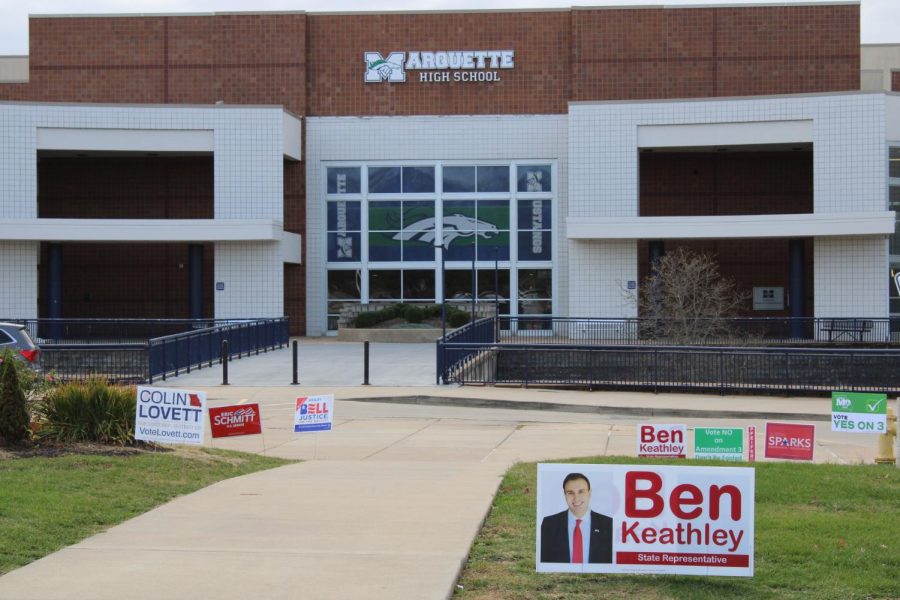Your donation will support the student journalists of Marquette High School. Your contribution will allow us to purchase equipment and cover our annual website hosting costs. You may become a PATRON by making a donation at one of these levels: White/$30, Green/$50, Blue/$100. Patron names will be published in the print newsmagazine, on the website and once per quarter on our social media accounts.
Media by Parker Brandt
Marquette hosted a polling station for the Midterm Elections November 8. Carter Gleason, senior, volunteers as a poll worker to check voters in. He was able to cast his vote in this election for the first time.
2022 Midterm Elections
Students usher in new generation of voters
December 1, 2022
Volunteering as an election judge at the polls on Tuesday, Nov. 8, Carter Gleason, senior, realized how few people really vote.
“It can be extremely difficult for people working 9-5 jobs to get out and vote, and it’s even more difficult for, often low-income, citizens who work outside of 9-5 hours,” Gleason said.
He said that if election day was a national holiday, there would be much easier access for people to be able to make it out to vote. RSD was off school that day allowing for easier access to voting for faculty and staff and those students of voting age.
Gleason turned 18 this past year and was able to cast his vote on Tuesday, Nov. 8, making him one of the first to usher in an entire new generation of voters.
Gleason signed up to volunteer at the polls through a link posted at politics club. He started volunteering for the 2020 presidential election, which interested him and sparked his love of politics.
“I was very happy to vote for the first time,” Gleason said. “Even if you think your vote won’t change anything, you still have to vote. Only when everyone votes, can we truly gauge the country’s opinion.”
Gleason was one of 27 percent of voters ages 18 to 29 who cast a vote in this election, according to an early estimate by the Center for Information and Research on Civic Learning and Engagement at Tufts University. This would be the second highest turnout for voters under the age of 30 in at least the last three decades.
Anna Gray, social studies teacher, has been integrating the midterm elections into her Contemporary Issues and Government classes this semester by highlighting their importance and having her students do research on candidates and statewide initiatives.
“There are some really interesting toss-up states in the mix this year for the Senate race,” Gray
said.
After the first day of tallying, Georgia, notoriously a swing state, had to extend voting for their Senate candidates selection through a run-off, which will take place Dec. 6.
Gray also had been following Pennsylvania, another toss-up state, which ended up electing its Democratic candidate, despite having more Republican-voting counties.
Gray said she had a few students who expressed excitement about the elections this year and were eager to show her their sample ballots.
Mahita Avasarala, senior, wasn’t eligible to vote in the midterm elections; she won’t turn 18 until next July. This didn’t curb her election enthusiasm, though.
“I think voting is extremely important, even when a voter does not agree with me,” Avasarala said. “The whole point of living in a democracy is that the government represents the will of the people. If we do not go out and vote, then we are not embodying the true spirit of the system we live in.”
For Avasarala, and many in her generation, voting is the next big milestone achievement coming in the next few years. Many candidates and nonprofits, like “I am a voter” and Missouri’s U.S. Senate candidates Trudy Busch Valentine and Eric Schmitt have put messages or information online to encourage voter turnout.
Midterm elections generally have a lower voter turnout than presidential elections, typically because they are seen as less important. The 2020 presidential election had the highest voter turnout of the 21st century, with 66.8 percent of citizens 18 years or older participating, according to the U.S. Census. Votes from the November midterms could take weeks to be counted, but are projected to exceed 2018, which was the highest voter turnout in a midterm since 1914.
“Voting is a must because it is the expression of our voices and the utilization of rights that have been fought for over 200 years,” Avasarala said. “I couldn’t see a scenario in which I do not try to get my vote in.”

